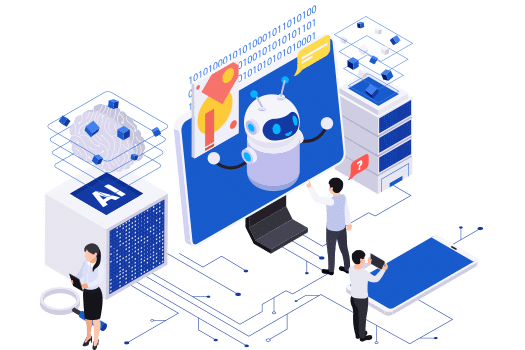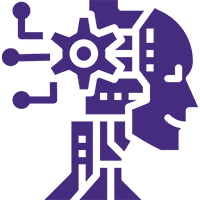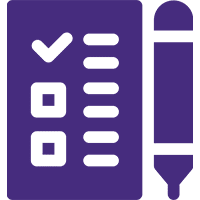The leading VR app development company in USA, offering comprehensive virtual reality solutions that deliver immersive and engaging experiences for businesses across industries.
Carmatec specializes in creating immersive VR apps that transform digital experiences by placing users in fully interactive virtual environments. Our expert team leverages advanced VR technologies to develop tailored solutions for various industries, including gaming, education, and healthcare. We focus on delivering high-quality, realistic simulations that enhance user engagement and provide innovative solutions to real-world challenges. Partner with Carmatec to bring your vision of virtual reality to life with cutting-edge technology and expert design.

Carmatec offers comprehensive VR app development services, leveraging advanced technologies and a systematic approach to create immersive and engaging virtual reality experiences. Their VR app development services include the following:

Carmatec's team works closely with clients to understand their business objectives, target audience, and specific requirements for the VR app. This analysis helps in determining the scope and direction for the project.

Carmatec creates a conceptual design for the VR app, considering factors like visual style, user experience, and interactions. Storyboarding and prototyping are used to provide clients with a clear understanding of the app's look and feel.

Using industry-leading tools and technologies such as Unity 3D, Carmatec's experienced VR developers bring the conceptual design to life. We focus on optimizing performance, ensuring smooth interactivity, and delivering high-quality visuals.

Carmatec conducts rigorous testing at various stages of the development process to identify and fix any bugs, glitches, or performance issues. This includes compatibility testing across different devices and platforms, ensuring a seamless VR experience for users.

Once the VR app is thoroughly tested and approved, Carmatec assists in deploying the app to the desired platforms, whether it be app stores or internal distribution channels. We handle the necessary steps to ensure a successful launch.

Carmatec provides ongoing maintenance and support after the launch of the VR app. This includes bug fixes, updates, and enhancements to ensure the app remains up-to-date and continues to deliver a seamless user experience.
Carmatec’s VR app development process in the USA involves a systematic approach that ensures the successful creation and deployment of immersive virtual reality experiences. Here’s an overview of their VR app development process:

Carmatec's team collaborates with you to understand your business objectives, target audience, and specific requirements for the VR app, enabling them to develop a clear project roadmap.

In this phase, Carmatec creates a conceptual design of the VR app, including storyboarding, defining the user experience, and determining the visual style and interactions.

Using industry-leading tools and technologies like Unity 3D, Carmatec's expert VR developers build the VR app according to the approved design, ensuring optimal performance, interactivity, and high-quality visuals.

Rigorous testing is conducted throughout the development process to identify and address any bugs, glitches, or performance issues. Carmatec performs different types of testing, including compatibility testing across devices and platforms, to ensure a smooth VR experience.

Once the VR app is thoroughly tested and approved, Carmatec assists with deploying the app to the desired platforms, whether it's app stores or internal distribution channels. We handle the necessary steps to ensure a seamless launch.

Carmatec provides ongoing maintenance and support post-launch, including bug fixes, updates, and enhancements. We ensure that the VR app remains up-to-date with evolving technologies and addresses any issues that may arise.
Carmatec’s expert team of VR developers offers adaptability to cater to various business needs and industry-specific projects. So, if you’re looking for VR app development services, we are well-equipped to cater to your requirements.
When it comes to choosing an VR app development company in the USA, Carmatec stands out as a top choice for several reasons. Here’s why you should consider Carmatec:

Carmatec has extensive experience in VR app development, with a team of skilled developers who are well-versed in the latest technologies and tools. Their expertise allows them to create immersive and captivating VR experiences tailored to your specific requirements.

Carmatec is committed to delivering top-notch VR apps that meet the highest quality standards. We follow a systematic approach and perform rigorous testing to ensure the app functions flawlessly and provides a seamless user experience.

Carmatec believes in fostering a collaborative partnership with their clients. We actively engage with you throughout the development process, involving you in decision-making and incorporating your feedback to ensure the final product aligns with your vision.

Carmatec utilizes a comprehensive and versatile technology stack for VR app development. We leverage tools like Unity 3D, Vuforia, OpenCV, WebGL, and Three.js, enabling them to create optimized VR experiences across various platforms and devices.

Carmatec has a strong focus on client satisfaction. We prioritize clear and open communication, ensuring that your needs are understood and addressed throughout the project. Their goal is to deliver a VR app that aligns with your business objectives and exceeds your expectations.

Carmatec provides ongoing support and maintenance services to ensure that the VR app remains up-to-date and performs optimally. This includes bug fixes, updates, and enhancements to keep the app relevant and compatible with evolving technologies.
Feel free to reach out to our VR Specialist. We welcome both existing specific use-cases as well as high level ideas for future apps.
VR (Virtual Reality) app development involves creating applications that immerse users in a fully virtual environment using VR headsets or devices. These apps can simulate real-world experiences or create entirely new digital worlds for entertainment, training, education, and more.
VR apps offer immersive experiences that can enhance learning, training, and entertainment by providing users with interactive, 3D environments. They can improve engagement, provide realistic simulations, and create unique opportunities for innovation across various industries.
VR apps can be developed for various platforms, including Oculus Rift, HTC Vive, PlayStation VR, and standalone devices like Oculus Quest. They can also be tailored for mobile VR using devices like Google Cardboard or Samsung Gear VR.
VR apps are beneficial in numerous industries, including gaming, education, healthcare, real estate, tourism, and training. They can be used for purposes such as virtual tours, medical simulations, immersive learning, and entertainment.
The cost of developing a VR app varies based on factors like the app’s complexity, the platform it’s being developed for, and the features required. Costs can range from $30,000 for a simple app to over $200,000 for complex, feature-rich VR experiences.
VR app development typically involves technologies like Unity, Unreal Engine, VR SDKs (like Oculus SDK, SteamVR), 3D modeling tools, and various programming languages such as C# and C++. These technologies help create immersive and interactive VR experiences.
Yes, VR apps can be integrated with AI (Artificial Intelligence) to create intelligent virtual characters and environments, or IoT (Internet of Things) to interact with real-world devices within the VR environment, enhancing interactivity and realism.
Challenges in VR app development include ensuring high performance to prevent motion sickness, creating intuitive user interfaces for a 3D space, managing hardware limitations, and ensuring the app is accessible and comfortable for all users.
Security and privacy in VR apps are ensured through data encryption, secure user authentication, and adherence to best practices for handling sensitive data. Compliance with industry standards and regulations is also critical, especially when dealing with personal or medical data.
VR apps can create realistic simulations for training in fields like medicine, aviation, and industrial work. They can also provide immersive learning environments for education, allowing students to explore historical sites, conduct virtual experiments, or engage in interactive lessons.
The future of VR app development includes advancements in realism, interactivity, and accessibility. As VR hardware becomes more affordable and widespread, we can expect to see more innovative applications in various fields, including telepresence, virtual collaboration, and immersive storytelling.
Post-launch, VR apps require regular updates to fix bugs, add new features, and ensure compatibility with the latest VR hardware and software. Continuous support and maintenance are essential to keep the app running smoothly and to enhance the user experience over time.
Yes, VR apps can be designed to work offline, especially for content that doesn’t require internet connectivity, such as single-player games or standalone training modules. However, features like online multiplayer or cloud-based content may require an internet connection.
To get started with VR app development, you should first define the scope and goals of your project, choose the target platform(s), and work with a development team experienced in VR technologies. It’s also essential to consider the user experience and hardware requirements early in the planning process.